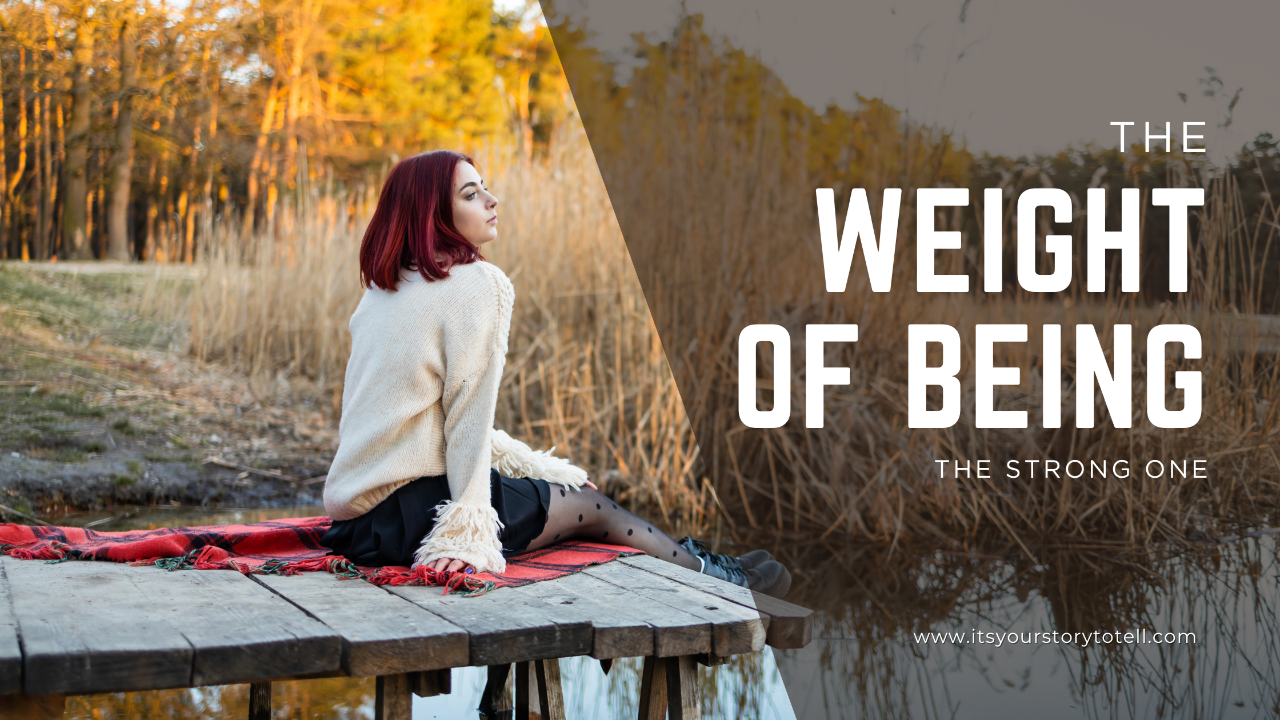Healing Trauma: The Power of Curiosity, Community, and Compassion
Apr 10, 2023
Trauma can be complicated to overcome, but curiosity, community, and compassion make it possible to begin healing.
Accepting that unhealthy responses and actions are signs of something wrong (self-awareness) that needs our attention and healing (personal responsibility) is the first step to starting a transformation journey.
Because you have found this community centered around transforming trauma, my guess is you realize you may be experiencing it. Or you don't know that it's trauma, but you know you are stuck, avoiding, running, or trying to fix what is happening in your head and around you.
As a survivor of trauma, I know revisiting memories can be painful. If you’re like I was, you avoid talking about it or acknowledging its impact on your life. Yet, here's what I learned from personal experience and working with hundreds of clients. When we avoid our feelings, we ignore the brain's way of alerting us that something is wrong. Things in life continue to get worse until we reach a breaking point.
The nature of trauma is overwhelming. It can feel impossible to talk about without causing re-traumatization. Still, we can uncover things without creating more trauma by taking a different approach. That's by leveraging the power of curiosity.
The inability to design the life of your dreams is likely the result of needing to identify the root cause of what is keeping you stuck.
There's a secret to lasting transformation and creating the life of your dreams. Those principles are curiosity, community, and compassion.

The value of curiosity.
- Becoming an observer distances you from being in the center of the experience and makes revisiting the past more tolerable.
- Allows more optimal emotional regulation for processing as the trigger to fight, flight, flee, and fawn reduces.
- Asking questions allows for an honest dialogue with ourselves. It provides a better understanding of what is happening.
- It moves us from feeling and our subconscious reaction to a more factual, cognitive assessment.
- Being curious changes the victim's mindset and places us in a mindset of growth and possibility, so transformation occurs.
Look at an example of applying curiosity to the emotion of anger and approach it with a question to understand what it's communicating. Responding to a question may seem trivial. But, validating holds significant power in diffusing the experienced emotion. It allows us to hear the message and the feeling it’s trying to convey.
The curious approach helps individuals and, when helping others process their stories. It helps them understand how it shapes the reality of where they find themselves. Having someone else ask you questions can be very helpful because they can see things objectively and ask questions you may not consider or may be avoiding. What emerges from curiosity are feelings of acceptance, being heard, and being valued, which is recommended to move past trauma.
As you integrate this practice, begin with less intense emotional reactions. Implementing this new approach when you already feel overwhelmed can be challenging, and starting there will likely be discouraging and unsuccessful. Build your understanding to eventually meet those needs as you exercise minor reactivity first.
Gradually, this will form a new pattern of response that becomes easier to access, even when confronted with highly intense emotional reactions.
Two ways curiosity can facilitate emotional healing.
- Lead us to explore the root causes of emotional reactivity.
- We can learn to capitalize on them, harnessing their power to benefit ourselves.
As we identify where we are through curiosity, we can leverage it to define our desires. When we see where we're at and where we want to be, we can begin to explore how to get there. In this, we break free from the stories that created false narratives, limiting beliefs, habits, and even continued trauma that kept us stuck.
Until I reached a breaking point in my life and began my transformation journey seven years ago, I always wondered how I ended up where I was. Still, it was not until I started understanding trauma and getting curious that I could identify three clear memories before age eight.
Those memories developed into narratives, beliefs, and ways of engaging with others that made me vulnerable. I was a people pleaser with low self-worth, resulting in ongoing traumatic relationships. As I practiced this approach, I could follow my triggers and negative emotions to the root cause and change my response. Since then, I've built the life of love and connection I had always desired, and it’s possible for you, too!

Healing trauma does not happen alone because trauma happens in relationships.
When something terrible happens to us or in proximity, and we do not have the love, support, connection, and resources to process the experience, it becomes a trauma.
Some people face awful tragedies but do not move forward in a healthy way, creating unhealthy attachments. The result is continued destruction in their life because they didn't address what happened. Healthy attachment is the key to overcoming trauma because it is an unhealthy attachment that traumatizes the person.
If you have signed up to get our blog posts, you also received a resource to explain the different attachment styles. Use it to help you identify how your style might affect your ability to connect and trust yourself and others.
If you feel burdened with the effects of trauma, I can guarantee you need a relationship with at least one person to support you while you heal. Trauma can have a wide range of effects on people, depending on the severity of the event, the person's age, culture, and psychological makeup.
Some common effects of trauma include:
- Physical and emotional injuries.
- Flashbacks, nightmares, and intrusive thoughts.
- Anxiety, depression, and post-traumatic stress disorder.
- Problems with relationships and social interactions.
- Problems in school or work.
- Issues with physical health.
Those with trauma often feel forsaken and that they are the only person experiencing such complex things. So, when they expand their community to a trusted friend, a coach, a therapist, or a group of people facing some of the same obstacles, they can feel connected. It’s crucial to create an environment and community so you can continue sticking with the hard work required to build a thriving, fulfilled life.

When someone takes the time to listen to your story and confirm your experiences, it can be incredibly healing. It shows that you matter, your experiences are real, and you are not alone. It can be an important reminder that you are not crazy and do not have to suffer in silence. It is a powerful step on the road to healing.
Community is also essential to prevent passing the trauma, and achievable by creating a safe and supportive environment for children and adolescents. Some steps to consider are providing them with a stable home life, access to quality education, and a strong support system.
Teach children healthy coping skills to manage difficult emotions and provide them with access to mental health services when needed. Also, create a culture of openness and acceptance so children feel comfortable discussing their experiences and seeking help.
When I struggled with my trauma, I could not successfully provide this for my children, which traumatized them. The good news was that as I became healthy, our environment changed. I could offer them more healthy attachment, and we engaged in healthy coping skills that allowed them to transform their trauma.
The value of community (relationship).
- Safety and security.
- Connection and belonging.
- Meaning and purpose.
- Hope
- Support
- Empowerment
My podcast, It's Your Story to Tell, will launch on April 28th, with me sharing part of my story and the impact of trauma. I’ll discuss how I am working to break the cycle in my life. I also host stories of those close to me to support others near and far to do the same.
Episode 2 is one I am very excited about because it will be my son, Brantley, and he will share his transformation journey. The idea behind the podcast is to share stories that inspire and give hope to those wanting to change their life.
I invite you to join our community of brave, vulnerable people contending for freedom in their lives, families, communities, and our world. With the proper support, it is possible to learn and grow in managing the effects created by trauma and move forward in life.
Sign Up here to get the episodes in your inbox!

Compassion is needed to heal trauma.
Trauma can result in damaging, critical self-talk and a lack of self-love, which can lead to a lot of emotional pain. When we experience a traumatic event, it can be nearly impossible to think of ourselves positively. We may be so focused on the event that we need help to get past it. We may tell ourselves that we're not good enough, that we're not worth it, and that we're not strong enough. The cure for that is developing compassion for yourself.
Self-compassion means we accept ourselves for who we are, warts and all. We permit ourselves to be authentic and forgive ourselves for what we did wrong. We understand that we are human, that we are going to make mistakes, and that we are not perfect.
When we do this, we begin to feel better about ourselves. We see ourselves in a more positive light, which leads to feeling more confident. We no longer need to put ourselves down, and we can start to enjoy our lives again.
It sounds easy enough, but it is, in fact, one of the most challenging things for a traumatized person to do, which is why community is so important. In my journey, I needed a healthy model of compassion. Like most suffering the effects of trauma, I had not been given a healthy connection or validation after the negative experience. I had no idea how to be compassionate and meet my needs.
When I joined my first group specifically addressing sexual trauma, it was one of the most challenging steps in my journey. I had kept it hidden all these years.
As a result, I went into self-blame, self-hatred, shame, and distrust, all the furthest things from kindness and compassion towards myself. I felt so much shame, and here I would have to share it and bring it to light with others.
I knew how I felt about myself because of what had happened. I feared that others would think I was disgusting and judge me. I told myself I brought this on myself.
To my surprise, that was the furthest thing from what happened. These women showed me love, validated my experience, got angry, grieved, let me cry, and even cried with me.
I was not alone. They knew me and offered me love and compassion without judgment. They taught me to love myself, meet my needs, sit with my experience, and feel what I needed to move forward with a different story about myself and my abuse.
So, if you are struggling with negative self-talk and a lack of self-love, please try to develop compassion for yourself. It may not be easy initially, but it is worth it. You are worth it, and you deserve to be happy. Be gentle with yourself.
Don't expect yourself to heal overnight. Recovering from a traumatic experience takes time, and there will be days when you feel you're not progressing. That's okay. Just keep moving forward, one step at a time.
The value of compassion.
- Easier to cope with the trauma you've experienced.
- More likely to forgive yourself.
- More likely to find the strength to move on.
Continue following along in this community because I will share the power of affirmations, mindfulness, yoga, journaling, good sleep, and eating habits in developing self-compassion and supporting your healing journey.
“Healing from trauma is virtually impossible to do on your own. When you have spent years trying to avoid, run, forget, or fake it, you need a fresh pair of eyes to assist in getting to the root of what is holding you back.” ~ Megan Babcock
xoxo, Megan

PS. If you haven’t already, subscribe to our weekly blog and enjoy a FREE related resource to support your journey. Like & follow us on social media for more content to encourage, inspire, and offer you insight!
View The Entire Collection
See all our blog posts to discover valuable insights and tools for navigating trauma and healing with guidance and support.













